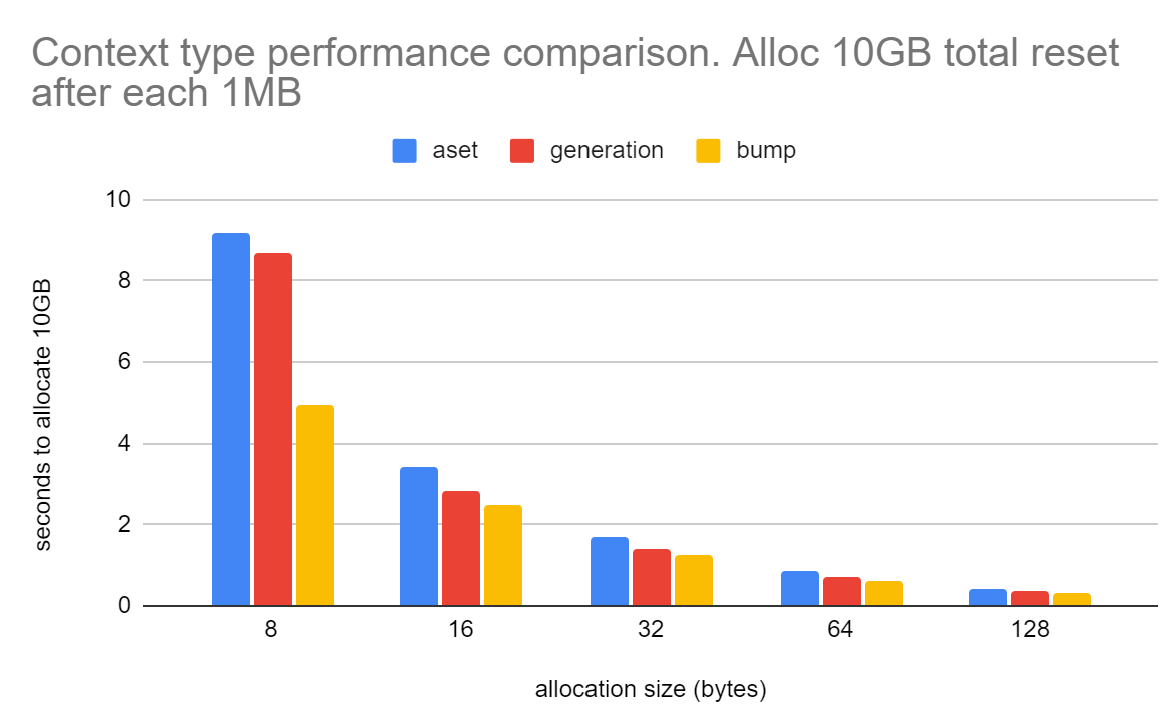Add bump memory context type and use it for tuplesorts
| From: | David Rowley <dgrowleyml(at)gmail(dot)com> |
|---|---|
| To: | PostgreSQL Developers <pgsql-hackers(at)lists(dot)postgresql(dot)org> |
| Subject: | Add bump memory context type and use it for tuplesorts |
| Date: | 2023-06-27 09:19:26 |
| Message-ID: | CAApHDvqGSpCU95TmM=Bp=6xjL_nLys4zdZOpfNyWBk97Xrdj2w@mail.gmail.com |
| Views: | Raw Message | Whole Thread | Download mbox | Resend email |
| Thread: | |
| Lists: | pgsql-hackers |
Background:
The idea with 40af10b57 (Use Generation memory contexts to store
tuples in sorts) was to reduce the memory wastage in tuplesort.c
caused by aset.c's power-of-2 rounding up behaviour and allow more
tuples to be stored per work_mem in tuplesort.c
Later, in (v16's) c6e0fe1f2a (Improve performance of and reduce
overheads of memory management) that commit reduced the palloc chunk
header overhead down to 8 bytes. For generation.c contexts (as is now
used by non-bounded tuplesorts as of 40af10b57), the overhead was 24
bytes. So this allowed even more tuples to be stored in a work_mem by
reducing the chunk overheads for non-bounded tuplesorts by 2/3rds down
to 16 bytes.
1083f94da (Be smarter about freeing tuples during tuplesorts) removed
the useless pfree() calls from tuplesort.c which pfree'd the tuples
just before we reset the context. So, as of now, we never pfree()
memory allocated to store tuples in non-bounded tuplesorts.
My thoughts are, if we never pfree tuples in tuplesorts, then why
bother having a chunk header at all?
Proposal:
Because of all of what is mentioned above about the current state of
tuplesort, there does not really seem to be much need to have chunk
headers in memory we allocate for tuples at all. Not having these
saves us a further 8 bytes per tuple.
In the attached patch, I've added a bump memory allocator which
allocates chunks without and chunk header. This means the chunks
cannot be pfree'd or realloc'd. That seems fine for the use case for
storing tuples in tuplesort. I've coded bump.c in such a way that when
built with MEMORY_CONTEXT_CHECKING, we *do* have chunk headers. That
should allow us to pick up any bugs that are introduced by any code
which accidentally tries to pfree a bump.c chunk.
I'd expect a bump.c context only to be used for fairly short-lived and
memory that's only used by a small amount of code (e.g. only accessed
from a single .c file, like tuplesort.c). That should reduce the risk
of any code accessing the memory which might be tempted into calling
pfree or some other unsupported function.
Getting away from the complexity of freelists (aset.c) and tracking
allocations per block (generation.c) allows much better allocation
performance. All we need to do is check there's enough space then
bump the free pointer when performing an allocation. See the attached
time_to_allocate_10gbs_memory.png to see how bump.c compares to aset.c
and generation.c to allocate 10GBs of memory resetting the context
after 1MB. It's not far off twice as fast in raw allocation speed.
(See 3rd tab in the attached spreadsheet)
Performance:
In terms of the speed of palloc(), the performance tested on an AMD
3990x CPU on Linux for 8-byte chunks:
aset.c 9.19 seconds
generation.c 8.68 seconds
bump.c 4.95 seconds
These numbers were generated by calling:
select stype,chksz,pg_allocate_memory_test_reset(chksz,1024*1024,10::bigint*1024*1024*1024,stype)
from (values(8),(16),(32),(64),(128)) t1(chksz) cross join
(values('aset'),('generation'),('bump')) t2(stype) order by
stype,chksz;
This allocates a total of 10GBs of chunks but calls a context reset
after 1MB so as not to let the memory usage get out of hand. The
function is in the attached membench.patch.txt file.
In terms of performance of tuplesort, there's a small (~5-6%)
performance gain. Not as much as I'd hoped, but I'm also doing a bit
of other work on tuplesort to make it more efficient in terms of CPU,
so I suspect the cache efficiency improvements might be more
pronounced after those.
Please see the attached bump_context_tuplesort_2023-06-27.ods for my
complete benchmark.
One thing that might need more thought is that we're running a bit low
on MemoryContextMethodIDs. I had to use an empty slot that has a bit
pattern like glibc malloc'd chunks sized 128kB. Maybe it's worth
freeing up a bit from the block offset in MemoryChunk. This is
currently 30 bits allowing 1GB offset, but these offsets are always
MAXALIGNED, so we could free up a couple of bits since those 2
lowest-order bits will always be 0 anyway.
I've attached the bump allocator patch and also the script I used to
gather the performance results in the first 2 tabs in the attached
spreadsheet.
David
| Attachment | Content-Type | Size |
|---|---|---|
| membench.patch.txt | text/plain | 8.0 KB |

|
image/png | 52.2 KB |
| bump_context_tuplesort_2023-06-27.ods | application/vnd.oasis.opendocument.spreadsheet | 110.8 KB |
| bump_allocator.patch | text/plain | 35.3 KB |
| sortbenchall.sh.txt | text/plain | 2.3 KB |
Responses
- Re: Add bump memory context type and use it for tuplesorts at 2023-07-10 23:51:11 from David Rowley
- Re: Add bump memory context type and use it for tuplesorts at 2023-07-26 00:11:49 from Nathan Bossart
Browse pgsql-hackers by date
| From | Date | Subject | |
|---|---|---|---|
| Next Message | torikoshia | 2023-06-27 10:03:21 | Re: RFC: Logging plan of the running query |
| Previous Message | Yuya Watari | 2023-06-27 09:11:14 | Re: Making empty Bitmapsets always be NULL |